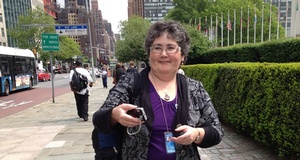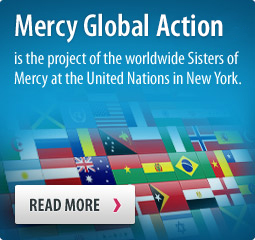
Understanding Advocacy; Mercy at the United Nations (the perspective from a Sister of Mercy of Aotearoa New Zealand)
Reports: February 26, 2017
Tama tu, tama ora, tama noho, tama mate
Stand and live or sit and die.
This whakatauki (proverb) provides an insight as to what advocacy is about. The whakatauki would be a maxim that Catherine McAuley would agree with and live by. I am thinking of two phrases associated to Catherine:
‘It is not sufficient for Jesus Christ be formed in us, he must be recognized in our conduct.’
‘If we love God, we will also love our neighbor; they are as cause and effect’.
 Sisters of Mercy are known for their work on the ground in at least 40 countries. We work with and advocate for those who have minimal access to resources to make their voice heard. These voices, stories and experiences are why Sisters of Mercy are at the United Nations. Many policies made at Nation State level can have an impact on the politics and actions at a global level and vice versa. We are now in world in which we have companies who cross international boundaries in the pursuit of profit, with little concern for the impact it has on poorer Nation States. The gap between rich and poor is widening. The task of Sisters of Mercy, as a Non-Governmental Organisation (NGO) at the UN, is to provide a moral and ethical voice to the discussion; to inform our Sisters across the globe when a Nation State, where Sisters are based, is faltering on policies or treaties that could have a negative impact on the most vulnerable. This relationship is two way.
Sisters of Mercy are known for their work on the ground in at least 40 countries. We work with and advocate for those who have minimal access to resources to make their voice heard. These voices, stories and experiences are why Sisters of Mercy are at the United Nations. Many policies made at Nation State level can have an impact on the politics and actions at a global level and vice versa. We are now in world in which we have companies who cross international boundaries in the pursuit of profit, with little concern for the impact it has on poorer Nation States. The gap between rich and poor is widening. The task of Sisters of Mercy, as a Non-Governmental Organisation (NGO) at the UN, is to provide a moral and ethical voice to the discussion; to inform our Sisters across the globe when a Nation State, where Sisters are based, is faltering on policies or treaties that could have a negative impact on the most vulnerable. This relationship is two way.
Mercy Global Action Aotearoa New Zealand is focused on advocacy within New Zealand and the wider region of the Pacific as we have Sisters in Samoa and Tonga. Awareness is raised for our Sisters and Partners in mission, on issues considered harmful for the most vulnerable. The focus is primarily issues related to Climate Change and Water, Human Trafficking and Agenda 2030, in the implementation of the Sustainable Development Goals. For the short time that I am based at the UN, I have seen and heard these issues expanded on within the global context. The tragedy is that as I hear examples of injustices occurring from advocates in other countries…I am reading online, of similar examples happening back in Aotearoa New Zealand.
 |
| Reporting back from small group feedback at Civil Society Forum prior to the commencement of CSocD 55 |
At the time of writing this, the 55th Commission for Social Development is taking place, where the theme is looking at strategies to alleviate poverty (the first Sustainable Development Goal of Agenda 2030). Sisters of Mercy, along with other NGO and Civil Society Members have been covering the Commission and hosting side events where specific issues that contribute to poverty are expanded and discussed on. Sisters of Mercy, with NGO partners, organized and sponsored a side event that focused on the following topic “Defense of Land and Water as a Strategy to Eradicate Poverty”. This issue is controversial in that Governments will argue that development is necessary to improve the lives of all citizens….and on the opposing side, citizens who see the wanton destruction of the environment and necessities for life (e.g. water), the lack of respect for the sacredness of an area being trampled on continually. Why is it important? There is a correlation between ‘development for the sake of development and profit’ and the abuse of human rights. The human rights abuses are primarily on those who are marginalized in society – indigenous peoples.
Aotearoa New Zealand indigenous voice is the tangata whenua; outside Aotearoa, this is Maori. Maori are the Kaitiaki (the guardians and protectors) of the environment and of their culture. This is acknowledged in Te Tiriti o Waitangi (The Treaty of Waitangi) in 1840 between Maori and the Crown. Unfortunately, as history has shown, the Crown has ignored Maori’s special role and encroached and developed in areas that have caused great harm to the environment. Such development is creating problems today, in particular with water quality of our lakes and streams, due to the excessive development of land for the dairy industry.
The ongoing tensions in North Dakota over the construction of an oil pipeline through sacred land of the Lakota Sioux and underneath the Missouri River is another example. The Lakota Sioux are the guardians and protectors of their region...the development of the pipeline ignores their role. The Lakota Sioux, along with other concerned groups, see the potential environmental disaster in this pipeline, the lack of benefits coming to their community, and the continual violation of human rights.
The tragedy in this example, in what has happened in Aotearoa New Zealand and in many countries around the world is that the message that many governments and companies live by is “profit before people; profit before the environment”. As Sisters of Mercy we have to change this attitude …Pope Francis, in September 2016, reminds us and all, that “the object of Mercy is human life itself and everything it embraces” …thus a care of our common home is be implemented as another work of Mercy. Sisters of Mercy at the UN, and in all the countries of the world that we are based, are reminded of this and will advocate on this, because that is our mandate, given to us by Catherine McAuley herself.
Messages to: Bridget Crisp rsm - MGA Intern




